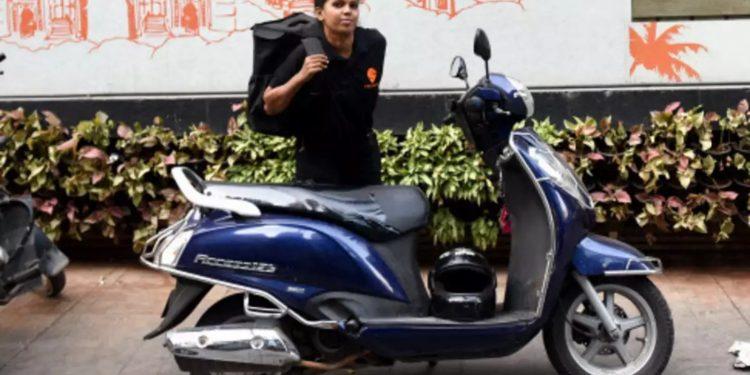No Bathrooms, No Safety, No Formalisation: For India’s Women Gig-workers, Companies’ Promises Ring Hollow

Courtesy: Business Insider
While the problems faced by gig workers in India have been under scrutiny of late, the specific concerns of female gig workers have not received as much attention. SABAH GURMAT writes about female gig workers’ biggest concerns: lack of access to washroom facilities, and personal safety.
———–
For 45 year old cab-driver Sheetal (who only goes by her first name), moving from being a regular commercial driver since Delhi’s Commonwealth Games, to joining Ola, first felt like a dream. From 2010 onwards, the rise of mobile app-based cab platforms Uber and Ola in India also came with promises of more independence and better pay for the drivers, even as those promised incentives soon began dipping drastically after the mid 2010s.
But for drivers like Sheetal, the lack of incentives has been compounded by the ways app-based companies continue to treat women.
“Most of the women in this line are single mothers, and the breadwinners in their families. Women like me were drawn to the idea that one could log-in to the app and start at whatever time, after finishing our household duties”, she said, while lamenting that the “companies still choose not to positively differentiate between men and women”.
Ola, Uber, Swiggy, Zomato and Urban Company are amongst the many digital platforms that provide services constituting a large chunk of India’s booming gig-economy. According to the Associated Chambers of Commerce and Industry of India (ASSOCHAM), India currently has at least 15 million gig-workers, or ‘freelance’ workers. As per the Oxford Internet Institute’s 2017 Online Labour Index, India was the largest overall supplier of online labour, with its gig-workers forming 24% of global online labour.
As service providers through mobile-based apps, gig-workers find themselves caught up in an arbitrarily designed ratings and rewards-based online set-up that has been widely criticised. Today, the app-based system, poor work conditions, lack of social security benefits, and the failure to accord them ‘employee’ status legally remain some of the biggest hurdles for these workers. For women, this is compounded by gender-oriented concerns.
Also read: Petition in SC seeking social security benefits for Uber, Ola, Swiggy, Zomato employees
No bathrooms, lack of amenities
On September 23, 2021, the New York City Council passed six bills in a significant legislative package directed at the gig economy, with provisions to ensure that delivery workers be allowed access to bathroom facilities in restaurants, distance and route limits on how far a delivery-worker could be made to deliver, guarantees for minimum pay and other formalised benefits such as gratuity.
Meanwhile, earlier in June 2021, Zomato, the popular online food delivery platform, announced that it planned to increase women delivery workers from 0.5% to 10% of their total workforce. Through a blog post on their website, the company’s CEO Deepinder Goyal announced four initiatives to increase the participation of women delivery workers. These included: Access to safety-related tools such as self-defence training and safety kits; contactless deliveries; SOS and helpline buttons on the app’s interface; and extending support from the company’s partner-restaurants for amenities including access to their toilets.
Just last week, Swiggy also posted a public statement on their blog, highlighting similar steps taken to increase the employment of women delivery workers. Notably, in addition to initiatives similar to Zomato, the company also mentioned a “no-questions-asked, two-day paid monthly period time-off” menstrual leave for all its “regular female delivery partners.”
Despite these promises, women gig-workers have still been repeatedly denied access to such facilities. For Anita (name changed), a Zomato delivery-worker based in Mumbai, access to toilets in partner-restaurants is “not even something we would dare to try”, despite it being over a month since she joined amidst the company’s increasing hire of women workers.
“There are no facilities for us as workers, I have never even asked the restaurants (out of fear). I mostly just rely on petrol pumps in whichever areas I can find”, Anita said.
Speaking to The Leaflet, the anonymous Twitter account ‘@DeliveryBhoy’, who has been using the medium to chronicle the plight of gig-workers, noted that access to toilets have not been considered that big a problem by companies, given how the majority of workers are men. “For many gig-workers abroad you’d even hear of workers peeing in bottles, carrying urine in bottles so obviously this law was needed there whereas in India, the perception is men can pee anywhere”, he said while stressing that it was a hurdle for women.
Also read: Hands that deliver food are struggling to feed themselves
None of the spokespersons from Swiggy, Zomato, Uber and Ola that The Leaflet reached out to, chose to respond regarding questions about access to bathroom facilities. This story shall be updated if and when they choose to respond.
Meanwhile, Rinku Sharma, who is Vice-President of the Maharashtra App-based Transport Union and a member of the Indian Federation of App-based Transport Workers (IFAT) said that it was “absolutely true” that they still were not allowed to use the toilets in restaurants, “even though the government may have said we can use it.”
Sharma, who worked in Ola as a driver for six years, also pointed out the health risks faced by these women. “Many women try to hold their pee in. It goes up to 10-12 hours sometimes as well. If a woman has had an operation or a Caesarean, they can’t hold in for so long and they face bodily difficulties,” she noted while stressing how most women-drivers she knew preferred to drop and pick-up at airports just to be able to use their bathrooms and other facilities.
“In my research with women drivers, I had many tell me that they consciously did not drink water so that they would not have to pee. Some did not eat breakfast because if they did, they’d miss the peak hours”, said Kaveri Medappa, a PhD researcher from the University of Sussex, whose research focused on the work-life conditions of platform-based workers. Medappa also observed how the underlying health-issues posed by lack of access to amenities posed problems to many men as well.
She noted that, “Because this work is so male-dominated, peeing did not come up so much as a problem. But access to toilets, simply because they work for 12-15 hours a day, and health related issues such as urinary infections, gastrointestinal diseases, piles etc. all came up a lot, because of the nature of their work. It also has to do with irregular eating habits that this work regime forces people to do.”
Also read: Post-pandemic exploitation of food delivery workers, and the legal reforms needed
Security risks
As Uber and Ola gained popularity in India amidst the mid-2010s, both the companies publicised several initiatives to bring in more women cab-drivers. In 2015, Ola announced plans to launch its own ‘Pink Cabs’ service run by a fleet of all-women drivers. Uber also posted a statement that year aiming to create 50,000 jobs for women in India by 2020.
The Leaflet sent multiple emails to spokespersons at Ola and Uber to inquire about the data of women-drivers currently working in their fleet, however received no response. This story shall be updated if they choose to respond to the same.
Sheetal told us that safety, taboos around women driving at night and security-related concerns of family members remained some of the biggest hurdles for her and her co-workers. “Many of us choose to work at places like the international airport out of safety concerns; we are also in need of a separate space in the airport for women drivers”, she said, while stressing on how the companies have not been living up to promises of safety.
“We received nothing from the companies; just a kit with a pepper-spray. We want at least a feature on the app that allows for us as women drivers to be able to directly contact the company if the client is troubling us, or we feel at risk”, Sheetal noted. She further informed how Uber “had briefly given us a feature on the app, which was like a siren or like a camera that would be switched on to monitor the ride”; however, it was soon done away with, much to the anguish of women drivers.
Demands for a dedicated SOS and helpline support system on the app’s interface were raised by multiple women, who all highlighted “failure” on each company’s part to factor in gender-sensitivity into their work assignments. “They (companies like Zomato and Swiggy) should keep a delivery range of upto 2 to 3 kilometres if they can see we are women. At least for night-time deliveries, don’t make us travel long distances and ensure we have proper safe-zones assigned as women”, a woman delivery-worker from Zomato said, speaking on the condition of anonymity.
Sharma also pointed out how there was no gender-sensitive feature made available for female cab drivers, such as “a separate app or any scheme” for women drivers. “I know of women in Delhi working in Uber, but they have been complaining there that they get the same passengers (non-families/single men), just as male-drivers. Our union, IFAT, is fighting for special initiatives for women drivers and accountability for safety from the companies”, she said, while emphasising the importance of collectivising their struggles.
What is the solution?
Earlier in October 2021, Entrackr reported that over a 100 women beauticians affiliated with the platform-based Urban Company had gone on strike against the company’s low wages, taking away high commissions and dismal safety and work conditions for women. Following a series of protests and media-coverage, Urban Company is said to have slashed its commission charges on the beauty service workers.
While Sharma believes in the need for more power to the unions fighting for gig-workers’ rights, others such as Sheetal reiterated that the “onus should be on the government to respond and take action”.
“Our safety, our bathrooms, and the barriers to our entry can all be changed by government recognition. Look at foreign countries (the recent New York law, for instance). If the government takes such action, then even these companies will fall in line, with better wages and status like formal employees, including getting bathroom-access”, Sheetal noted.
Medappa agreed. “If you don’t create the conditions required for women to work, nobody’s going to join, and even if they join, they’ll be exploited. The companies will simply get to use the banner of women, which will get them good publicity, but the conditions of these workers won’t change.”
She then got to the heart of the matter. “The problem is not just lack of toilets; it’s this piece-rate system, the lack of any power to the workers and servility induced by the app-based platforms. When workers (men or women) have no power to fight back or to negotiate better conditions, this is what will happen. If a worker speaks out, their IDs will get blocked. There is a larger problem with the powerlessness created by design, and problems of access to toilets and other spaces are a symptom of that.”
(Sabah Gurmat is a staff-reporter at The Leaflet.)
Get the latest reports & analysis with people's perspective on Protests, movements & deep analytical videos, discussions of the current affairs in your Telegram app. Subscribe to NewsClick's Telegram channel & get Real-Time updates on stories, as they get published on our website.






















